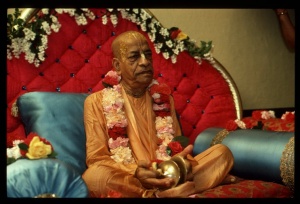SB 6.2.26: Difference between revisions
m (1 revision(s)) |
No edit summary |
||
| Line 1: | Line 1: | ||
{{info | {{info | ||
|speaker= | |speaker=Ajāmila | ||
|listener= | |listener=Viṣṇudūtas and Yamadūtas | ||
}} | }} | ||
[[Category:Srimad-Bhagavatam - Canto 06 Chapter 02]] | |||
[[Category:Bhagavatam Verses Spoken by Ajamila - Vanisource|060226]] | |||
<div style="float:left">'''[[Srimad-Bhagavatam]] - [[SB 6|Sixth Canto]] - [[SB 6.2: Ajamila Delivered by the Visnudutas|Chapter 2: Ajāmila Delivered by the Viṣṇudūtas]]'''</div> | |||
<div style="float:right">[[File:Go-previous.png|link=SB 6.2.24-25]] '''[[SB 6.2.24-25]] - [[SB 6.2.27]]''' [[File:Go-next.png|link=SB 6.2.27]]</div> | |||
{{RandomImage}} | |||
==== TEXT 26 ==== | ==== TEXT 26 ==== | ||
<div | <div class="verse"> | ||
aho me paramaṁ kaṣṭam | :aho me paramaṁ kaṣṭam | ||
abhūd avijitātmanaḥ | :abhūd avijitātmanaḥ | ||
yena viplāvitaṁ brahma | :yena viplāvitaṁ brahma | ||
vṛṣalyāṁ jāyatātmanā | :vṛṣalyāṁ jāyatātmanā | ||
</div> | </div> | ||
| Line 16: | Line 22: | ||
==== SYNONYMS ==== | ==== SYNONYMS ==== | ||
<div | <div class="synonyms"> | ||
''aho''—alas; ''me''—my; ''paramam''—extreme; ''kaṣṭam''—miserable condition; ''abhūt''—became; ''avijita-ātmanaḥ''—because my senses were uncontrolled; ''yena''—by which; ''viplāvitam''—destroyed; ''brahma''—all my brahminical qualifications; ''vṛṣalyām''—through a ''śūdrāṇī'', a maidservant; ''jāyatā''—being born; ''ātmanā''—by me. | |||
</div> | </div> | ||
| Line 23: | Line 29: | ||
==== TRANSLATION ==== | ==== TRANSLATION ==== | ||
<div | <div class="translation"> | ||
Ajāmila said: Alas, being a servant of my senses, how degraded I became! I fell down from my position as a duly qualified brāhmaṇa and begot children in the womb of a prostitute. | Ajāmila said: Alas, being a servant of my senses, how degraded I became! I fell down from my position as a duly qualified brāhmaṇa and begot children in the womb of a prostitute. | ||
</div> | </div> | ||
| Line 30: | Line 36: | ||
==== PURPORT ==== | ==== PURPORT ==== | ||
<div | <div class="purport"> | ||
The men of the higher classes—the brāhmaṇas, kṣatriyas and | The men of the higher classes—the ''brāhmaṇas'', ''kṣatriyas'' and ''vaiśyas''—do not beget children in the wombs of lower-class women. Therefore the custom in Vedic society is to examine the horoscopes of a girl and boy being considered for marriage to see whether their combination is suitable. Vedic astrology reveals whether one has been born in the ''vipra-varṇa'', ''kṣatriya-varṇa'', ''vaiśya-varṇa'' or ''śūdra-varṇa'', according to the three qualities of material nature. This must be examined because a marriage between a boy of the ''vipra-varṇa'' and a girl of the ''śūdra-varṇa'' is incompatible; married life would be miserable for both husband and wife. Consequently a boy should marry a girl of the same category. Of course, this is ''trai-guṇya'', a material calculation according to the ''Vedas'', but if the boy and girl are devotees there need be no such considerations. A devotee is transcendental, and therefore in a marriage between devotees, the boy and girl form a very happy combination. | ||
</div> | </div> | ||
__NOTOC__ | |||
<div style="float:right; clear:both;">[[File:Go-previous.png|link=SB 6.2.24-25]] '''[[SB 6.2.24-25]] - [[SB 6.2.27]]''' [[File:Go-next.png|link=SB 6.2.27]]</div> | |||
__NOTOC__ | |||
__NOEDITSECTION__ | |||
Revision as of 14:20, 11 May 2021

A.C. Bhaktivedanta Swami Prabhupada
TEXT 26
- aho me paramaṁ kaṣṭam
- abhūd avijitātmanaḥ
- yena viplāvitaṁ brahma
- vṛṣalyāṁ jāyatātmanā
SYNONYMS
aho—alas; me—my; paramam—extreme; kaṣṭam—miserable condition; abhūt—became; avijita-ātmanaḥ—because my senses were uncontrolled; yena—by which; viplāvitam—destroyed; brahma—all my brahminical qualifications; vṛṣalyām—through a śūdrāṇī, a maidservant; jāyatā—being born; ātmanā—by me.
TRANSLATION
Ajāmila said: Alas, being a servant of my senses, how degraded I became! I fell down from my position as a duly qualified brāhmaṇa and begot children in the womb of a prostitute.
PURPORT
The men of the higher classes—the brāhmaṇas, kṣatriyas and vaiśyas—do not beget children in the wombs of lower-class women. Therefore the custom in Vedic society is to examine the horoscopes of a girl and boy being considered for marriage to see whether their combination is suitable. Vedic astrology reveals whether one has been born in the vipra-varṇa, kṣatriya-varṇa, vaiśya-varṇa or śūdra-varṇa, according to the three qualities of material nature. This must be examined because a marriage between a boy of the vipra-varṇa and a girl of the śūdra-varṇa is incompatible; married life would be miserable for both husband and wife. Consequently a boy should marry a girl of the same category. Of course, this is trai-guṇya, a material calculation according to the Vedas, but if the boy and girl are devotees there need be no such considerations. A devotee is transcendental, and therefore in a marriage between devotees, the boy and girl form a very happy combination.